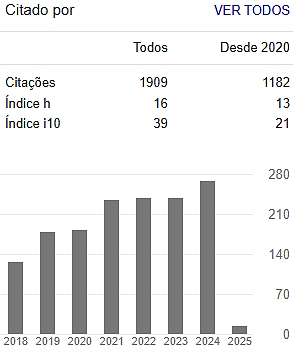ISSUE TOUCHING SCHOOL QUALITY IN AMHARA REGION
Palavras-chave:
Amhara region, Elementary school, Quality Education, Quality indicatorResumo
The objective of this study was to explore factors that affect quality education in the Amhara region. A descriptive survey method, purposive and stratified random sampling techniques were used to examine research objective. Tools used in collecting data were questionnaire and focused group discussion. The finding showed that positive early experiences and interactions, disciplined school systems, providing an adequate number of teachers, access to toilets, availability of relatively suitable class sizes, welcoming schools boarding atmospheres , learner centered teaching practices , professional mobility and growth were strengths of schools in the region. However, violation conditions, professional inflexibility, incompatible teachers working conditions, irregularity of students’ class attending, lack of life skill curriculums, schools facilities, shortage of instructional materials, clean water supply and not have ongoing trainings have negative impact on quality education. As a result, it is recommended that a further research on quality education, focusing specifically indicators that support a quality primary education.
The objective of this study was to explore factors that affect quality education in the Amhara region. A descriptive survey method, purposive and stratified random sampling techniques were used to examine research objective. Tools used in collecting data were questionnaire and focused group discussion. The finding showed that positive early experiences and interactions, disciplined school systems, providing an adequate number of teachers, access to toilets, availability of relatively suitable class sizes, welcoming schools boarding atmospheres , learner centered teaching practices , professional mobility and growth were strengths of schools in the region. However, violation conditions, professional inflexibility, incompatible teachers working conditions, irregularity of students’ class attending, lack of life skill curriculums, schools facilities, shortage of instructional materials, clean water supply and not have ongoing trainings have negative impact on quality education. As a result, it is recommended that a further research on quality education, focusing specifically indicators that support a quality primary education.The objective of this study was to explore factors that affect quality education in the Amhara region. A descriptive survey method, purposive and stratified random sampling techniques were used to examine research objective. Tools used in collecting data were questionnaire and focused group discussion. The finding showed that positive early experiences and interactions, disciplined school systems, providing an adequate number of teachers, access to toilets, availability of relatively suitable class sizes, welcoming schools boarding atmospheres , learner centered teaching practices , professional mobility and growth were strengths of schools in the region. However, violation conditions, professional inflexibility, incompatible teachers working conditions, irregularity of students’ class attending, lack of life skill curriculums, schools facilities, shortage of instructional materials, clean water supply and not have ongoing trainings have negative impact on quality education. As a result, it is recommended that a further research on quality education, focusing specifically indicators that support a quality primary education.

